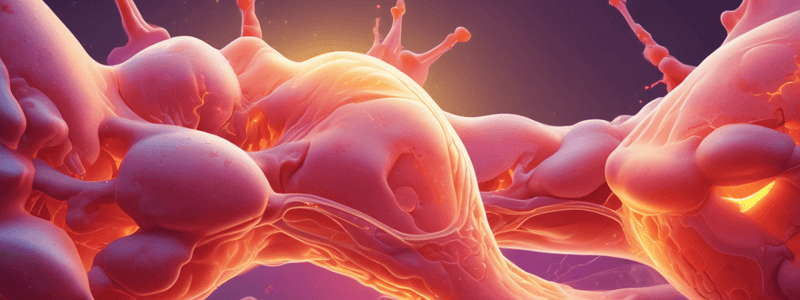Podcast
Questions and Answers
What is the aim of chronic gout management?
What is the aim of chronic gout management?
- To promote joint damage
- To accelerate acute flares
- To maintain the 'intercritical' phase (correct)
- To increase tophi formation
How is joint damage primarily caused in chronic gout?
How is joint damage primarily caused in chronic gout?
- By excessive synovial fluid production
- By immune system malfunction
- Due to bacteria invasion
- Through granuloma formation or crystalline deposition (correct)
What role does urate-lowering therapy (ULT) play in treating gout?
What role does urate-lowering therapy (ULT) play in treating gout?
- It increases uric acid levels in the body
- It reduces the body's uric acid levels (correct)
- It induces tophi formation
- It promotes acute flares
Which medication is recommended for severe chronic gout that does not respond to other therapies?
Which medication is recommended for severe chronic gout that does not respond to other therapies?
What process does pegloticase perform in the body?
What process does pegloticase perform in the body?
Why might it be debated whether 'intercritical' gout should be treated more aggressively?
Why might it be debated whether 'intercritical' gout should be treated more aggressively?
What is the primary excretion route of Febuxostat?
What is the primary excretion route of Febuxostat?
Which drug is rapidly metabolized to oxipurinol, its active form?
Which drug is rapidly metabolized to oxipurinol, its active form?
What do Xanthine Oxidase Inhibitors (XOIs) primarily target in gout treatment?
What do Xanthine Oxidase Inhibitors (XOIs) primarily target in gout treatment?
Which condition is a contraindication for Uricosuric Agents?
Which condition is a contraindication for Uricosuric Agents?
What is the unique feature of Pegloticase among ULT agents?
What is the unique feature of Pegloticase among ULT agents?
Why has the clinical use of uricosuric agents diminished over time?
Why has the clinical use of uricosuric agents diminished over time?
Flashcards are hidden until you start studying



